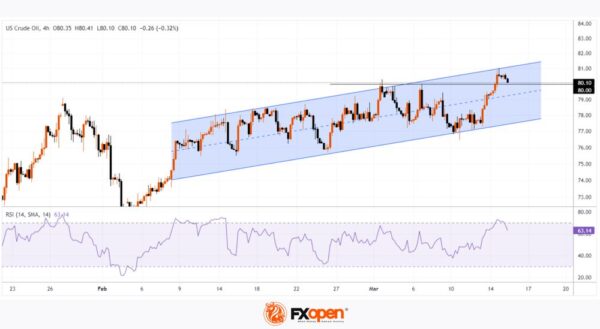The International Energy Agency (IEA) has once again raised its forecasts for global oil demand in 2024. While the agency’s forecast pointed to the prospect of an oil surplus in 2023, its analysts now believe that the world will experience a shortage of oil in the second half of 2024.
Among the reasons for the shortage:
→ limitation of oil production by OPEC+ countries, it is 2 million barrels per day until the middle of the year. And it may be extended, as Bloomberg writes — the decision is scheduled for June 1;
→ changes in logistics routes due to Houthi attacks on tankers in the Red Sea.
Also, a bullish impulse for the price of WTI oil can be provided by the geopolitical situation, which remains tense.
The WTI oil chart shows that:
→ the price has exceeded the psychological level of USD 80 per barrel and is trying to gain a foothold there;
→ the price moves within the ascending channel (shown in blue);
→ long upper shadows on the candles around USD 81 indicate seller activity. This is where the upper boundary of the channel lies, so there is reason to consider the level of USD 81 as current resistance.
Perhaps long position holders decided to take profits at the 4-month high in WTI oil prices. One way or another, given the activity of sellers and the presence of RSI indicator values in the overbought zone, this market is vulnerable to a pullback after growing by more than 4% this week. It is possible that the price will adjust to the median line of the channel.
Start trading commodity CFDs with tight spreads. Open your trading account now or learn more about trading commodity CFDs with FXOpen.
This article represents the opinion of the Companies operating under the FXOpen brand only. It is not to be construed as an offer, solicitation, or recommendation with respect to products and services provided by the Companies operating under the FXOpen brand, nor is it to be considered financial advice.

